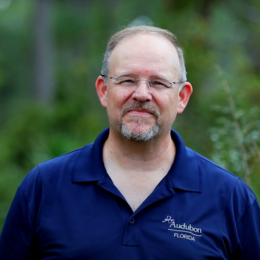As more people move to North Florida, water needs are projected to rise. The 2023 North Florida Regional Water Supply Plan projects a 32 percent increase in water demands in the region by 2045 due to a nearly 50 percent population increase. This plan is updated every five years through a partnership between the St. Johns River and Suwannee River Water Management Districts.
The 2023 plan also calls out the harm caused by using additional groundwater to meet this demand, including many springs, rivers, and lakes that would suffer decreased flows and more than 8,000 acres of wetlands that may be negatively affected.
Audubon Florida has solutions to meet our future water needs without damaging our natural resources. North Florida Policy Associate Chis Farrell recently detailed these solutions at a district meeting:
- Half of single-family home water use goes to outdoor irrigation. Reducing turfgrass use will decrease demand and make large amounts of high-quality drinking water available to serve our growing population. This would remove the need for large, expensive water development projects that take water from our environment.
- Use of native plants eliminates most water demands while providing lush landscaping and wildlife habitat. Updated landscape design practices improve the beauty of our neighborhoods while saving water and energy.
- Wastewater reuse should prioritize methods with the most benefit and least potential for unintended harm. Audubon Florida recommends a focus on projects that involve groundwater recharge of water that meets advanced wastewater treatment standards. Rather than focusing on reuse for outdoor irrigation (which is energetically demanding and a potential non-point source of pollution), we encourage the districts to consider projects that help solve many challenges at once. For example, aquifer recharge projects have used treatment wetlands to cost-effectively achieve impressive nutrient reductions while providing wildlife habitat, recreation, and tourism benefits (a great example is Sweetwater Wetlands in Gainesville).
Across the state, Audubon Florida continues to work directly with water management districts to meet the water needs of communities while protecting birds and the places they need.




